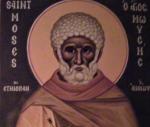
Christianity is a religion of mercy and grace, but such mercy and grace would be worthless if it were not also a religion of truth and justice. The truth matters. Justice matters. Mercy and grace only make sense if we recognize that satisfaction must be made for injustices. Neither would be needed if we are not to be held responsible for what we do, that is, for our sin. Both are necessary once we understand the harm we have done goes beyond what we can fix all by ourselves. We would be stuck, without a way out, without hope for things to be better, if we could not receive mercy and grace. Mercy and grace are offered as ways to help us deal with the consequences of injustices, to make sure that all the harm we have caused does not get the last say.
What we should realize is that when we receive mercy and grace we are still expected to repent and change our ways, that is, to reform ourselves. Grace is not being given so that people can continue doing whatever evil they did in the past with the presumption that grace will take care of all their problems. Grace is not cheap. We have been warned that we will have to deal with the harm we done to others, or to the world as a whole: “Make friends quickly with your accuser, while you are going with him to court, lest your accuser hand you over to the judge, and the judge to the guard, and you be put in prison; truly, I say to you, you will never get out till you have paid the last penny” (Matt. 5:25-26 RSV). The accuser will be those who we have wronged; the judge is the just judge, Jesus, whom we will encounter in the last judgment, and who will make sure we will deal with all our sins:
But if someone does not obey the unspoken will of the Holy Spirit and shows himself to be resistant, doubtless a man of this sort, after his departure from this life, must be offered to the Son of God, who is judge of the living and the dead, by whom he is handed over to that officer, that is, to the angel of torments, to be thrown into the prison of Gehenna. From there he will not be released until he pays back even the last penny, that is, discharges the entire penalty of the debt down to the last sin. [1]
We are offered grace so that through it, we can turn our lives around, and after doing so, have the means to fix what we have damaged in the world. Grace perfects nature; what lies beyond our ability to repair can be accomplished by grace, but if we neglect what we can do by ourselves, we will find grace remains inactive. This is why we can’t treat grace as the solution to everything and think we have nothing to do ourselves. We have been told differently. We have been told to work out our own salvation with fear and trembling (cf. Philip. 2:12). We will have to pay back the last penny.
All of this is true, not only for each and one of us on a personal level, but for humanity as a collective whole. Injustices in the past, such as slavery, must be rectified, not just by the cessation of the evil activity, but by overturning the harm it has caused. Sin has a social dimension to it, and so it requires social solutions. Just as there is to be no cheap grace in regards personal sins, there is no cheap grace in relation to social sins. Mercy and grace can be and should still be involved in the equation, but they should not be used to ignore our own responsibilities.
Christianity, in its understanding of the fall of humanity, demonstrates the social impact of sin and how it can and will affect later generations. Original sin is, as it were, the spiritual climate change which affects the human race. We are born into a world conditioned by the sins of the past. Original sin should not be seen as coming from a one-time event; rather, it is a reflection of humanity and the fall of humanity and the sins of humanity as they collectively affect human history.
Social sin, and the responsibility connected to it, will be with us til the end of the world, whereupon it will receive judgment by Christ:
But we are wretched sinners, yes, and our putrid works follow after us as well. These works are indelibly written in the book of fates [cf. Rev. 20:13], yet their impact extends beyond the borders of this human life. They enter into the fates of all human beings, in the history of all humanity, and upon each one of us hangs the fate of the entire world. We must pull back neither from participation nor from responsibility, and until the end of human history our works will endure. For this reason the Dread Judgment will occur simultaneously over all humanity, and each has lived the life of all humanity, each of the sons of Adam is the entire, ancient Adam. [2]
Trying to ignore social responsibility to sin, trying to say some evil done in the past is not our present responsibility is based upon a false understanding of humanity and human history. It tries to have every person turned into an individual cut off from everyone else, no longer influenced by or affected by each other. It falls for the error of sin itself, for sin tries to break down what should be united. We are not meant to be an island cut off from everyone else. We are meant to join be one, sharing with each other all that we are.
Christianity teaches us we are all interconnected, and we all bear responsibility for our collective sins, including those done before us, a collective sin represented as “The Old Adam,” while the transcendence we are to find ourselves drawn to is that found in “The New Adam” Jesus Christ, where we find ourselves one with Jesus, working with him to repair the harm done by the “Old Adam”:
With the incarnation of the divine Logos in the person of Jesus Christ came the “spiritual man,” the second Adam. By the “natural man,” the first Adam, is not to be understood only one particular person among others but a personality synthesizing the whole of mankind according to nature, and the second Adam likewise is not only this individual but at the same time a universal being who sums up in himself the whole of reborn mankind; Christ is the spiritual centre of a universal organism in the real of eternal divine existence. [3]
Only by accepting our responsibility will we be able to move forward. Only by joining in with the work of Christ can grace come to its fulfillment and establish true, perfect justice within us. But if we resist, if we try to say Jesus does everything and we are to do nothing, if we try to be hedonistic quietists who think the only thing we need to do is accept grace and it will take care of us, we have not yet fully embraced the New Adam, meaning, we are still within the Old Adam, bearing all the responsibility of collective human sin.
This is why it is very anti-Christians to ignore communal sin. It ignores the way humanity is presented in Scripture, either in relation to sin and its shared inheritance of sin in Adam, or in the way of humanity is to come together in the New Adam and through him, find salvation. If we join in with Christ, then we will work with Christ to fix the harm that we have caused due to sin. This is why Paul talks about sharing in the sufferings of Christ:
For as we share abundantly in Christ’s sufferings, so through Christ we share abundantly in comfort too. If we are afflicted, it is for your comfort and salvation; and if we are comforted, it is for your comfort, which you experience when you patiently endure the same sufferings that we suffer. Our hope for you is unshaken; for we know that as you share in our sufferings, you will also share in our comfort. (2 Cor. 1:5-7 RSV):
Paul recognized he had a role to play, a role which he had in relation to his unity with Christ, a role which likewise we are all called to have, one which looks for and works for the benefit of all as a part of the Christian way of life. Ignoring this, looking out for ourselves at the expense of others, only show us how much we remain attached to the Old Adam. The more we are drawn into Christ, the more we are drawn beyond the Old Adam, the more we will look for injustices which have been neglected, or have not sufficiently been dealt with, and engage them, realizing that is what is expected of us. We are to do far more than simply stop sinning, we are to embrace the way of love and the virtue it brings, a way which will have us, like Christ, seek to repair the harm sin has done to the world. If we are not willing to make amends, if we try to deny reparations for the sins which have yet to be satisfied, personally or collectively, we have not truly cut ourselves from sin, and so risk, through our attachment, experiencing what will happen at the condemnation of sin in the last judgment, because we will have tied ourselves not to justice, but to sin itself.
[1] St. Chromatius of Aquileia, Sermons and Tractates on Matthew. Trans. Thomas P. Scheck (New York: Newman Press, 2018), 199 [Tractate 22].
[2] Sergius Bulgakov. Spiritual Diary. Trans. Mark Roosien and Roberto J. De La Noval (Brooklyn, NY: Angelico Press, 2022), 149-50 [10/23.V.1925].
[3] Vladimir Solovyey, God, Man & The Church. The Spiritual Foundations Of Life. Trans. Donald Attwater (Cambridge: James Clarke & Co., 2016), 68.
Stay in touch! Like A Little Bit of Nothing on Facebook.
If you liked what you read, please consider sharing it with your friends and family!
N.B.: While I read comments to moderate them, I rarely respond to them. If I don’t respond to your comment directly, don’t assume I am unthankful for it. I appreciate it. But I want readers to feel free to ask questions, and hopefully, dialogue with each other. I have shared what I wanted to say, though some responses will get a brief reply by me, or, if I find it interesting and something I can engage fully, as the foundation for another post. I have had many posts inspired or improved upon thanks to my readers.













